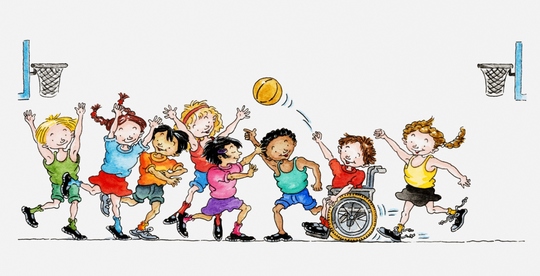 Drink Up! Drink Up! Unless you've been living under a rock, you have heard about Beyoncé's stunning new visual album Lemonade. And if you have kids who are between the ages of 10 and, oh, 80 who are into pop music, it's safe to assume that they have too. There's been a lot of talk about the album as it relates to Beyoncé and Jay-Z's marriage with allegations of cheating as one of the central themes. But there are a lot of diversity themes for kids to talk about embedded throughout. Use it as a way to talk about any number of the themes below or within the context of your child's interests. Music is very powerful so use it to bond and learn with your child. I'm pretty sure they'll be listening to it anyway... Race: Queen Bey does not shy away from highlighting African-American culture in this album. She pays homage to the Black Lives Matter movement and specifically to the Black men who have been killed recently (e.g. Michael Brown, Trayvon Martin) and their families. She includes footage from a speech by Malcolm X. Even her much-discussed comment about 'Becky with the good hair' is a racial reference. It's not all about cheating - that line has to do with perceptions of beauty in society. An important discussion for any curly-haired girl. Gender: This album is really centered around Black women - just watch it through and that'll immediately become clear. Bey showcases female empowerment, but also female vulnerability. While this is important to talk about with the young women in your life, it should also be a topic of conversation with men and boys as well. The themes presented are just as important to them. Region: This visual album appears to me to be distinctly Southern. I'm a proud New Yorker and even though I now live just south of the Mason-Dixon, Southern culture is not something I'm very familiar with. I know that New Orleans culture is featured pretty prominently with many of the traditions and festivals unique to the area on display in several songs. I definitely plan to learn more about some of the images I saw. Do the same with your teens & tweens! Socioeconomic Status/Class: In one of the interludes between songs, a man talks about the significance of meeting the President. One of the things he mentions is that the President is from the 'hood just like him: Chi-Raq (aka Chicago & a Spike Lee movie). It appeared that it was important for Beyoncé to show the reality for people who don't necessarily have a lot of money, opportunity, or hope (as the man who met Obama described). Sexual Orientation: This one is brief in the visual album, but in 'All Night' Queen Bey shows examples of couples in love. A few of those are same-sex couples. This is done without fanfare (which can be even more powerful), but it's there. Age: Beyoncé mostly showcases Black people, especially women, in the visual album and she shows women of all ages. There appears to be a celebration of females; from young girls to 90-year-old women - especially in the song 'Freedom'. There are so many ways to go about actually talking about this album with your teen or tween. Here are some potential areas of interest. Pick your child's favorite and start the conversation:
So dive right in! It will definitely be entertaining and as you and your teen/tween continue to have discussions. You are sure to learn something together. Let me know how it goes. What was challenging? What interested your child the most? Where did you start? Most importantly, which was everyone's favorite song?!? Leave a comment below. **A quick disclaimer: The lyrics of this album are quite explicit. There are sexual themes and profanity (in my opinion, not much worse than most PG-13 movies nowadays). If you are concerned about that, listen to the album beforehand. But keep in mind, that your child may be able to see the album even if you don't approve. Just something to consider... Did you enjoy this post? Sign up for our newsletter! Instead of having to remember to check out the blog, you will get great information delivered right to your email. Tips, strategies, articles, and videos so you don't have to figure it all out yourself! When you sign up, you will receive a useful book list for kids of all ages-babies to teens. Enjoy!
0 Comments
 I. Am. Appalled. This new Tennessee law is one of the most unbelievable pieces of legislation I've seen in awhile. Discriminatory laws always bother me, but this one really hits home. The law basically tells any mental health professional 'Sure, go ahead and violate your ethics. No problem - it's totally fine!' Ummm, except it's not. I am a school psychologist so I am most familiar with my ethics as a psychologist and as a school psychologist (yes - there are 2 separate ones). I know what the American Psychological Association (APA) and the National Association for School Psychologists (NASP) have to say about ethics. I am less familiar with counselors, social workers, and other helping professionals. To my wonderful colleagues out there - if anything I say is incorrect or misleading, please comment below. But I'm pretty sure that ALL of us adhere to the same basic ethical principles. I believe that this law advocates breaking several ethical principles, but the one that stands out to me is: Respect For People's Rights and Dignity You see that this is respect for rights and dignity. Not or. Telling someone that something is wrong with them when they contact you for help is the counseling equivalent to kicking someone when they are down. Anyone who seeks therapy is emotionally vulnerable and telling them that you can't treat them because of who they are?? SO UNETHICAL. If you want to read the entire ethics code for psychologists, you can access it here. How many other ethical violations do you see? Leave a comment below. I am not implying that every counselor should have to treat every patient that walks through their door - this would also be unethical. You should only treat those who are within your areas of competence and expertise. But if the sole reason that a counselor is turning someone away is because they are gay or transgender, that's ethically, and I would argue morally, wrong. If you live in Tennessee and you seek counseling and are turned away solely because of your sexual orientation or gender identity, please, please, please report that person to their respective national organization. That's right - skip right over the state organization and go national. By causing distress based on discrimination they are breaking their ethics. That should be reported. Not sure which organization to report to? Here's a handy list: Psychologist - American Psychological Association; http://www.apa.org/ Psychiatrist - American Psychiatric Association; https://www.psychiatry.org/ Counselor - American Counseling Association; https://www.counseling.org/ Social Worker - National Association of Social Workers; https://www.socialworkers.org/ At least one organization holds the same belief that I do. Here is ACA's statement about the new Tennessee law: https://www.counseling.org/news/updates/2016/03/03/counseling-profession-under-attack-in-tennessee I couldn't find a direct response to the new law on APA's website, but this statement paper highlights similar concerns: http://www.apa.org/ed/graduate/conscience-clause-brief.aspx To you all, especially my colleagues in the trenches - what do you think about this law? Leave a comment below with your thoughts. Did you enjoy this post? Sign up for our newsletter! Instead of having to remember to check out the blog, you will get great information delivered right to your email. Tips, strategies, articles, and videos so you don't have to figure it all out yourself! When you sign up, you will receive a useful book list for kids of all ages-babies to teens. Enjoy! I've written a lot about teachers lately and the news hasn't been positive. I don't want people to think that I am down on teachers. I really think they have the hardest jobs in the world and coming from a family of educators and having worked in schools - I have seen this firsthand.
However, I also feel that there is data and information that cannot be ignored. There is something going on in schools and classrooms that we need to address, that needs to be discussed, that is affecting our children - all of them. Here is another article about racial disparities in classrooms. Take a read and then check out my previous blog posts about similar topics here and here. Have you seen any of this in your child's school? Did you experience anything similar when you were in school? Educators - what are you seeing in your schools? Leave a comment below. Did you enjoy this post? Sign up for our newsletter! Instead of having to remember to check out the blog, you will get great information delivered right to your email. Tips, strategies, articles, and videos so you don't have to figure it all out yourself! When you sign up, you will receive a useful book list for kids of all ages-babies to teens. Enjoy!  This is starting to become a pattern. And I don't like it... I recently read another article about teachers that was frustrating, to say the least, but again not surprising. This article may actually help explain my previous post about teacher diversity and student outcomes. It turns out that White teachers appear to have lower expectations of their students of color, specifically Black boys, than students who are also White. This worries me, and should worry everyone. I'll tell you why. This article highlights a significant problem that has been well documented. It's called the Pygmalion, or Rosenthal, Effect. Basically, it means that whatever someone's expectation is of you, that is the expectation that you will live up to. So if someone thinks you are a genius and will have your pick of Ivy League schools to attend then you are much more likely to live up to that standard. It also has a negative effect though. If the significant adults in your life think that you are much more likely to go to prison than to college, you are primed to live up to that standard too. The School-to-Prison pipeline is real, people. Really really real. This finding needs to matter to everyone - not just parents with kids of color. The way a teacher feels about his or her students impacts the way a classroom is run. It impacts how friendships are formed. It impacts the overall culture of the classroom. If the class subtly becomes an "us-vs-them" environment, there will be less collaboration and cooperation. Students won't learn as much from each other as they would in a more cohesive classroom environment. This matters for ALL students - not just Black and Brown. So, I'm going to ask the obvious question: What the heck is going on? Are all White teachers racist and bad people? Should only Black people be teachers? Umm, no - looking at things that way is much too simplistic. If the answers to these questions were yes, then it would be a pretty easy problem to solve. But it's not. It's really really not. In my opinion, I think a good place to start is to look at teacher training programs. How is diversity discussed? How is cultural competence developed in these programs? This is a subject that is near and dear to my heart. I wrote my dissertation on the multicultural competence development of school psychologists and let me just give you a quick nugget. My participants felt that their training programs did basically nothing to help them develop cultural competence. They felt they learned it on the job - almost entirely. But my participants worked in significantly diverse schools and school districts. What about those school psychologists who work in schools with very little diversity? How do they develop their cultural competence? And now the scarier question: Do they ever? The same can and should be asked of our teachers. I am by no means blaming teachers - they, quite easily, have the hardest job on Earth and I don't fault them for much. And simply blaming teachers would, again, be much too simplistic. The problem is more complicated than that, but this is clearly an area that must be addressed. All teachers are expected to walk into a classroom with the basic skills to impart knowledge. But as the article articulates, they also need to walk in and know how to inspire and have faith in all of their students. Because according to the Pygmalion Effect, their students' success - ALL of their students - depends on it. What do you think about this finding? Is it what you see in your child's school? Leave a comment below about what you have seen or heard. Did you enjoy this post? Sign up for our newsletter! Instead of having to remember to check out the blog, you will get great information delivered right to your email. Tips, strategies, articles, and videos so you don't have to figure it all out yourself! When you sign up, you will receive a useful book list for kids of all ages-babies to teens. Enjoy! Our newest feature, Just For Fun Fridays, launches tomorrow! I am incredibly excited to share it with you all. Some of you may be wondering, what is Just For Fun Fridays? Is it helpful? How can I use it? Will it be complicated? Is it really fun? Really? So, to answer all your burning questions (because I know you have 'em!), here's a quick guide all about these videos and how to use them for you and your family:
Does it sound easy, fun, and doable? That's because it is! Don't miss a post - sign up to get Just For Fun Fridays delivered to you every week! It'll give you some great ideas for things to do with your kids over the weekend or anytime.
 I know several women of color that I'm fairly certain will one day rule the world. There are my girlfriends: fast-moving, fast-thinking, and super dynamic. My mother and sister: brilliant and level-headed. They are always calm in any crisis (a gene that seems to have skipped me). My daughter and nieces: Don't be fooled because they are ridiculously cute. These ladies will be your boss one day and trust me - working for them will not be a walk in the park. But apparently, the odds are against all of them - myself included. We talk a lot about the issues women face in the workplace. Women make 79 cents to every man's dollar. Women are woefully underrepresented in leadership positions. But this is not equitable for all women. Specifically, women of color. Women of color make so much less than men, it's crazy. According to this article, Black women make 60 cents to every White man's dollar and Hispanic women/Latinas make 55 cents to every White man's dollar. That's almost half as much. HALF. Now, 79 cents is not ok, but 55 cents?? That is so unbelievably unacceptable. While White women make up 24.3% of private sector executive positions in the U.S., Black and Hispanic women make up 1.5% and 1.3%, respectively. And if you are wondering, no - that isn't representative of their numbers in the workforce. And certainly not representative of their numbers in the general population. For more information, check out this chart. If you're not in the U.S., I'd love to hear some of your numbers. Are these numbers the same in other countries? Better? Worse? Leave a comment below. If we're going to talk about equal pay for equal work and helping women to reach their potential in the work world, we need to talk about the whole picture. The 79 cents to every dollar quote that we hear thrown around is really just not accurate. If you are going to say 79 cents, you need to talk about White women as compared to White men, because the picture looks entirely different if you are a person of color. That 79 cents number does not represent me. Or my aforementioned girlfriends. Or my mother and sister. Or my daughter and nieces. The gap that applies to us is much more significant. So, you better believe that I'll be teaching my daughter (and my son for that matter - look closely at the chart - this applies to all women and anyone of color) that she will need to demand that she is paid what she is worth. Or better yet, start your own company and grow it until you are the boss. What will you teach your daughter/niece/cousin/friend? Leave a comment below. Either way I have no doubt that my little girl will become a force to be reckoned with - a serious #ladyboss. Because that apple does not fall far from its tree... Did you enjoy this post? Sign up for our newsletter! Instead of having to remember to check out the blog, you will get great information delivered right to your email. Tips, strategies, articles, and videos so you know that you're not alone! When you sign up, you will receive a useful book list for kids of all ages-babies to young adults. Enjoy!
 I wanted to share the following article, but I admit I'm frustrated by it as well. The results, though important, seem incredibly obvious to me. A lack of teacher diversity negatively impacts students of color. Is anyone surprised by this finding? But I know that we need to start somewhere and this is a good starting point. My hope is that it's not the ending point. There are always more questions to be asked. I believe that some of those questions are: how does a lack of racial diversity impact Caucasian students? How does this lack of diversity impact students who are not racial/ethnic minorities but rather sexual, religious, or linguistic minorities? When looking at teacher diversity, are we only interested in racial/ethnic diversity or does other diversity matter as well? What questions would you want answered next? What about the children in your life? An article like this is a great way to help them develop critical thinking skills. It is short and sweet and you could ask your child(ren) what additional questions they would ask. This could also be a great exercise to use in a classroom to inspire discussion. Educators - how might you use this article in your classroom? Parents - how would you use this for conversations with your kids? Leave a comment below. http://www.educationworld.com/a_news/further-research-finds-lack-teacher-diversity-negatively-impacts-minority-students-1256084765 Did you enjoy this post? Sign up for our newsletter! Instead of having to remember to check out the blog, you will get great information delivered right to your email. Tips, strategies, articles, and videos so you don't have to figure it all out yourself! When you sign up, you will receive a useful book list for kids of all ages-babies to teens. Enjoy! |
AuthorDr. Sweeney is a licensed school psychologist and cultural competence expert. Here are her musings on life in a multicultural world. Archives
February 2017
CategoriesInterested in writing a guest blog post? Contact me for more information!
|
Proudly powered by Weebly




 RSS Feed
RSS Feed